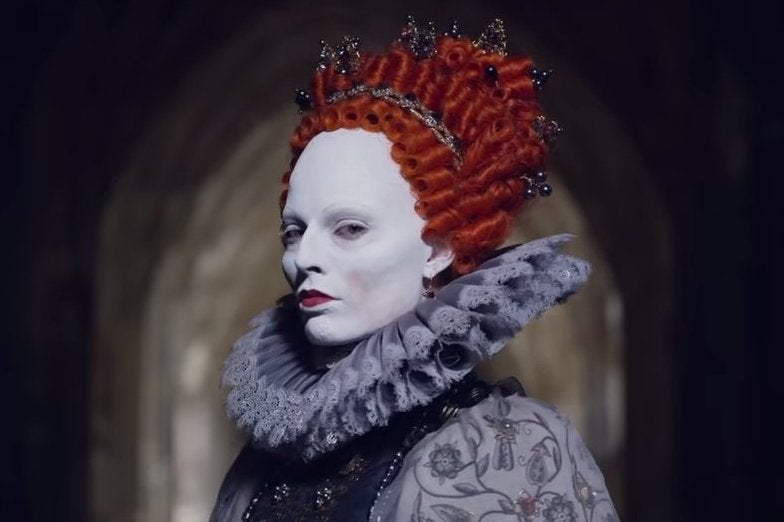The Top 10: Shocking Falsehoods in Historical Dramas
Some of us are banned from watching a certain sort of TV show because of the involuntary commentary: ‘That would never have happened’


Your support helps us to tell the story
From reproductive rights to climate change to Big Tech, The Independent is on the ground when the story is developing. Whether it's investigating the financials of Elon Musk's pro-Trump PAC or producing our latest documentary, 'The A Word', which shines a light on the American women fighting for reproductive rights, we know how important it is to parse out the facts from the messaging.
At such a critical moment in US history, we need reporters on the ground. Your donation allows us to keep sending journalists to speak to both sides of the story.
The Independent is trusted by Americans across the entire political spectrum. And unlike many other quality news outlets, we choose not to lock Americans out of our reporting and analysis with paywalls. We believe quality journalism should be available to everyone, paid for by those who can afford it.
Your support makes all the difference.This list was launched by Richard Morris, “just to see the fury it will generate”, and he kicked it off with: “Mary Queen of Scots and Elizabeth I didn’t meet as shown in the Mary Queen of Scots film of 2018.” Several people pointed out that Friedrich Schiller had already taken that liberty in his play (and Gaetano Donizetti in the opera based on it).
1. The Deal, the 2003 film about the agreement between Tony Blair and Gordon Brown that Blair should run for the Labour leadership in 1994. Blair did not order rabbit in Islington’s Granita restaurant, as Vikki Leffman, the restaurant’s owner, pointed out. But the bigger untruth is that it portrayed Blair as a shallow, grinning show pony against Brown as the deep, serious thinker. Thanks to John Fuchs and David Sutherland.
2. The Great Escape, 1963 film. The Americans, including Steve McQueen and that motorbike ride, were all invented. The Canadians were overlooked. The three who succeeded were Norwegian and Dutch, not Polish and British. Thanks to John Peters.
3. U-571, 2000 film. US navy submariners did not capture the first Enigma machine from the U-boat of the title thereby helping to win the Second World War. It was taken by HMS Bulldog months before the US entered the war. Tony Blair agreed in the Commons that the film was an “affront” to the British forces who did it. Nominated by Dunderheid, James Heale and Paul T Horgan.
4. Darkest Hour, 2017 film. The cabinet meeting was not held in the underground war rooms but in No 10; nor did Churchill practise his oratory for random Tube travellers. Thanks to Gerard Baker and Don Brown London.
5. Margaret Thatcher: The Long Walk To Finchley, BBC4 drama, 2008. Admittedly the opening credits subtitle it How Maggie Might Have Done It, but even so the depiction of Margaret Roberts, as she was when she was trying to win a parliamentary seat, making a pass at Ted Heath was too much for Jonathan Isaby.
6. Braveheart, 1995 film. “You could almost certainly do a Top 10 just from that one film,” said Elliot Kane. Everything from nine-year pregnancies to the use of woad via Sir William Wallace being portrayed as a peasant. James Dinsdale added a quotation from someone with a PhD in medieval Scottish history saying they would not have worn kilts: that is equivalent to “a film about colonial America showing the men wearing 20th-century business suits, but with the jackets worn back-to-front”.
7. The Sound of Music, 1965 film. “The Von Trapp family would have had to have yodelled their way across 300 miles of Alps to get from Salzburg to Switzerland,” said Bupendra Bhakta. Everyone knows they actually got a train to Italy.
8. El Cid, 1961 film. El Cid did exist in the 11th century, but in the film he fights for Spain, a country that did not. Another from John Peters.
9. Titanic, 1997 film. William Murdoch, the first officer of the ship, appears to have been impugned by James Cameron: there is no evidence that he shot two passengers and then himself. Nominated by Mick O’Hare.
10. Rome, HBO television series, 2005-07. In episode 1, set at the end of the Republic, the characters eat dormice, which was banned by the Senate in 115 BC, according to Pliny the Elder via Graham Kirby.
“Most of Shakespeare” was nominated by Tom Bloomfield. Nigel Fox pointed out, for example, that young Hal in Henry IV Part 1 was not a tavern-frequenting wastrel but actually fighting his father’s wars, and the dashing Henry Hotspur, with whom Hal was unfavourably compared, was in reality older than Hal’s father.
Well done, everyone. I think we managed to get through it without mentioning The Crown.
Next week: Inspired by 24 hours of clips of Christopher Plummer not actually singing “Edelweiss”, things people are remembered for that they didn’t actually do (as opposed to things they didn’t actually say, which we have done before).
Coming soon: Policies inspired by films, after Matt Hancock, the health secretary, suggested his vaccine strategy had been influenced by watching Contagion.
Your suggestions please, and ideas for future Top 10s, to me on Twitter, or by email to top10@independent.co.uk


Join our commenting forum
Join thought-provoking conversations, follow other Independent readers and see their replies
Comments